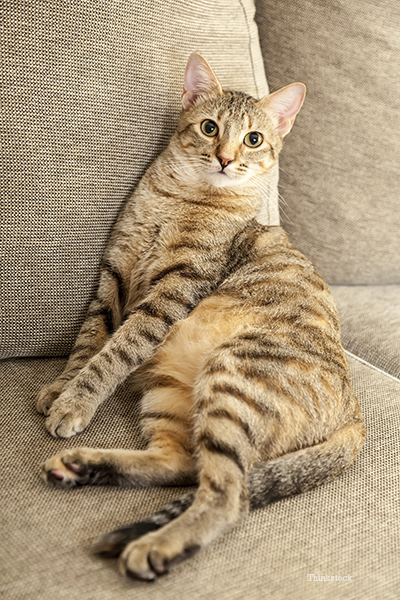
Dr. Ernie Ward reminds us all why cats sometimes misbehave due to environmental changes. Visit Dr. Ernie at www.DrErnieWard.com or on Facebook.

This appointment was going to take a while.
Mrs. Smith (not her real name) calmly stroked her purring feline as she continued raising her voice toward me.
“I don’t care what you think, Dr. Ward. I change her litter box quite enough! Frieda tells me when it’s time to clean the poo-poo pail and I empty it promptly.”
Frieda was having, as Mrs. Smith put it, “bathroom problems.” Veterinarians refer to urinating outside the litter box as “elimination disorders” or “inappropriate elimination.” It was going to be challenging to find anything Mrs. Smith would agree with me about during this visit.
“I haven’t changed her food, her litter, or her bowls. Frieda’s routine has remained the same. I haven’t traveled recently, had houseguests, or entertained friends for the past month because of the smell and stains. Either fix Frieda’s problem or I’ll find someone who can.” She smiled a smile that said she meant it.
Elimination disorders typically fall into two broad categories: physiological and psychological causes. Physiological disorders include conditions such as bladder infections, kidney disease, pain, hormonal disease, or bladder stones. Psychological or behavioral problems can be much more complicated. Cats can suddenly develop an aversion to the texture, smell, or even color of their litter. They may begin to dislike the location of the box or become frightened and avoid the room altogether. It can take a considerable amount of sleuthing to reveal the root of many behavioral causes of inappropriate elimination. Because Frieda’s diagnostic tests had come back normal, I needed to pull out my best Sherlock Holmes if I was going to solve this case.
A thought struck me. “How often do you entertain friends?” I asked.
“I’ve hosted a weekly bridge game for over ten years. That’s why I bought the new den furniture. It’s a shame I haven’t been able to show it off to the ladies.”
“Tell me more about this new furniture and where the den is located relative to Frieda’s litter box.”
“I bought the most beautiful couch you’ve ever seen. When Jim was alive he would’ve never approved. I replaced the couch we’d had for almost twenty years. I must admit I was sad to see it go because it was where Jim and Frieda would take their afternoon naps. I moved the new couch just outside the hallway that leads to the laundry room where I’ve always kept the litter box. I think it helps to make the den look bigger.”
Maybe I was on to something. “Does Frieda still nap on the couch?” I asked.
“Heavens no! She seems very upset with me for getting rid of ‘her’ sofa.”
Now for the hard part, “Mrs. Smith, I want you to bear with me for a moment as I offer a hypothesis on what may be causing Frieda to urinate in the house. Many cats tend to be creatures of habit; that is, they like a specific routine. As silly as it may sound, moving a new couch into her normal route to access the litter box may be causing her to avoid it.”
Mrs. Smith stopped stroking Frieda. She fixed me with a steely stare. “Are you saying my new couch is why Frieda is peeing on my rugs and bed?”
I nodded my head.
Her face relaxed and her voice chimed cheerily, “That actually makes sense. I’m not going to get rid of the couch; it cost too much.”
We discussed moving the couch, using a facial pheromone product, relocating the litter box, and adding another box. She agreed to move the couch and to pheromone treatment.
Two weeks later I called Mrs. Smith to check on Frieda. “It’s a miracle Dr. Ward! She hasn’t had an accident in almost a week! I actually caught her laying on the couch yesterday!”
Elimination disorders in cats can be a diagnostic challenge. Once medical conditions have been ruled out, it’s important to thoroughly evaluate your cat’s lifestyle. Most cases will improve by adding a larger, uncovered litter box in a quiet, less-trafficked area and using facial pheromones. Other times you have to move a couch.
If you have any questions or concerns, you should always visit or call your veterinarian -- they are your best resource to ensure the health and well-being of your pets.
